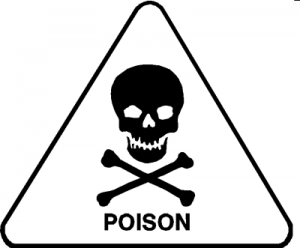Poisoning is an ever present risk thus poison prevention should be a year-round task. There are countless household chemicals and substances that can cause poisoning. As a matter of fact, thousands of persons, mostly children, are brought to hospitals each year due to accidental poisoning. However, there are simple things that you can do to prevent these accidents.
Here are some general guidelines on how you can prevent accidental poisoning.
- Store medications or harmful substances in their original or labeled containers. Never put
Proper education and prevention is important when trying to prevent poisonings in your home. harmful substances in an old beverage or food container.
- If taking medications, carefully read the medication label and follow the instructions properly. If taking medication at night, turn on the lights and read the label. Never double dose on any medication. In case doses have been duplicated, inform your healthcare provider or refer to the medication label.
- Never share prescription medicines. Use medicines exactly as prescribed by your physician.
- Check and clean out your medicine cabinets on a regular basis. Dispose your unused or expired medications properly.
- Poisons come in various forms. They can be liquid, solids, vapors (e.g. industrial gases and carbon monoxide), stings, and bites.
- If using solvents, paints or harsh cleaning fluids, make sure there is adequate ventilation. Similarly, wear adequate protective gear (goggles or face mask, long-sleeved clothes, and pants) if using weed or insect killers, solvents, pesticides and other garden chemicals.
- Keep emergency phone numbers (doctor, ambulance, emergency room and poison control center) programmed into your home and mobile phones.
- Check the caution labels of household chemicals and never mix them together.
Here are additional poison prevention tips for families with children.
- Children younger than 6 years are at higher risk for accidental poisoning since they love to put things in their mouths.
- Use child-resistant bottles or containers for medicine, chemicals, cleaning products or chemicals. However, do not assume that children will not be able to open “childproof” bottles. Keep them out of children’s reach.
- Double check areas where harmful substances are stored, especially if you have toddlers. Lock up these areas or move the substance in a safe place.
- Lock harmful chemicals or poisons. These include household cleaners and other substances that can burn your child’s skin or throat (lye, toilet, drain or kitchen cleaners). If it is not possible to lock the substance, be sure to keep it out of children’s reach or sight.
- Never call medications “candy”. Children may eat them like candy, putting them at risk for a drug overdose. Be careful with flavored chewable medications as they might take more than safe levels.
- Children love to imitate adults, so avoid taking medications in front of them.
- If you have indoor plants or garden, make sure to check if there are any poisonous plants. You can consult your local poison control or garden centre to determine which ones are poisonous. If there are poisonous plants, keep them out of reach. Better yet, replace them with safer plant varieties. Inform you children not to eat berries or plants they find outdoors.
More Information
To learn more about poison prevention and how to manage poisoned persons enrol in workplace approved first aid classes with a training provider near you. Only standard first aid, emergency childcare and standard childcare first aid programs have poisonings included in the curriculum. Register today and learn the basic skills to prevent and manage poisonings.

